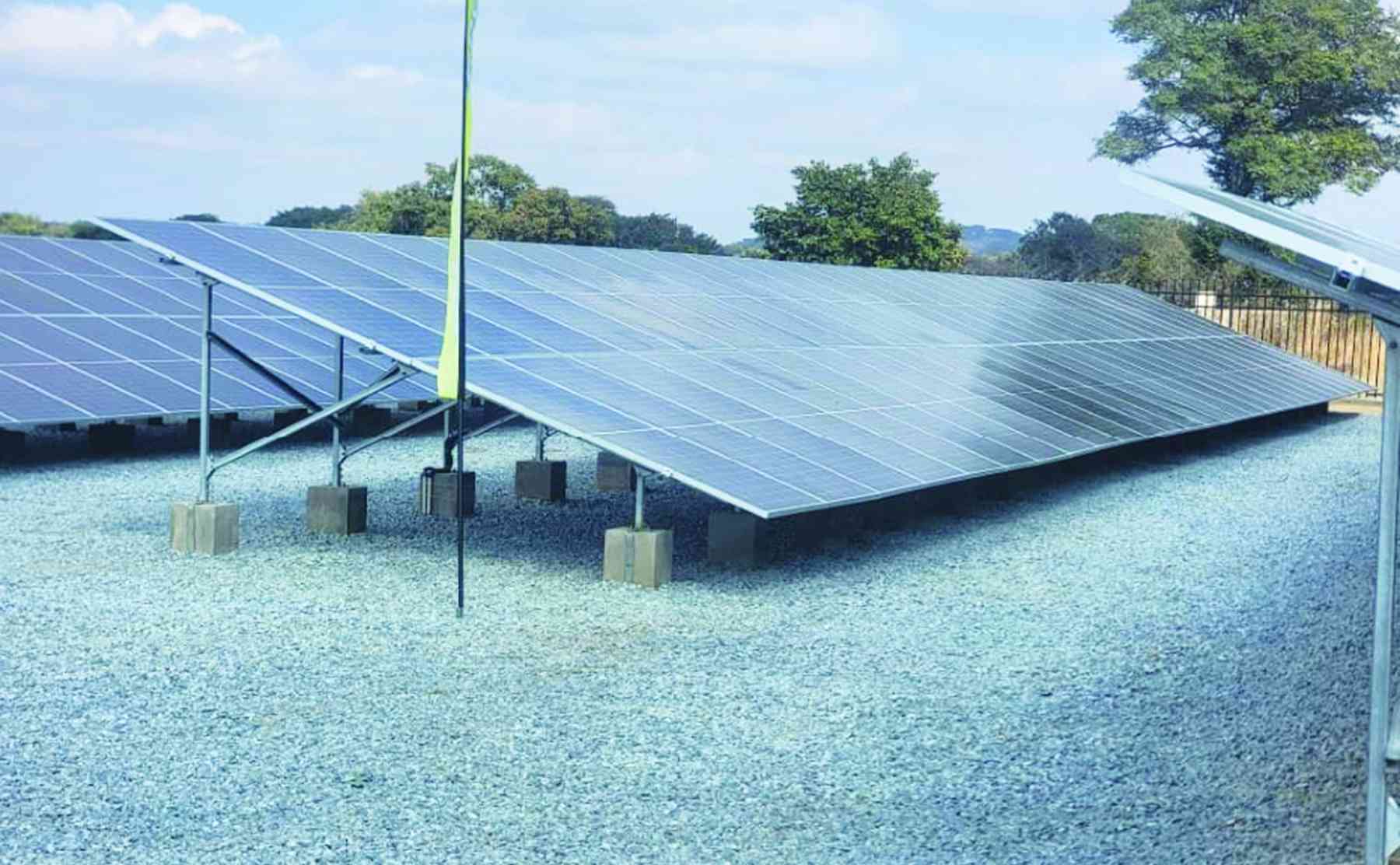
A group of people gathered around a solar plant behind Tongogara Business Centre in rural Gutu, Masvingo Province, as they marvelled at how neatly the 295 solar panels were installed.
To them, it is an attraction, but there is more to it.
The 160kw solar project has brought life to this seemingly neglected rural area within Gutu West constituency.
“I had never seen something like this, a whole field of solar,” said Learnmore Muzenda, a villager who lives nearby.
“This area is lit up, shops are connected, and we are indeed living in our town.”
Energy and Power Development minister, July Moyo, recently commissioned the Soti Source community solar project, about 35km from Mupandawana Growth Point, marking a milestone by the government in bringing clean energy to remote areas in Zimbabwe.
The project was implemented by the Rural Electrification Fund (REF).
“As a long-time advocate for renewable and inclusive energy, it gives me immense joy to see this light up Soti Source—bringing ICT, health and economic opportunity to families once left behind,” REF acting chief executive officer, Fellistas Makumbinde, said during the switching on ceremony held at Soti Source.
- Village Rhapsody: Why project managers fail in Zimbabwe
- Village Rhapsody: Why project managers fail in Zimbabwe
- Village Rhapsody: Why project managers fail in Zimbabwe
- News in depth: 'The untouchables': July Moyo gives tycoon, associates 'immunity' from prosecution
Keep Reading
At Soti Source clinic, newly-acquired freezers were evident, denoting a transition from archaic ways of storing medication that require low temperatures.
“We all wanted this; power availability eases our operations. Both nurses and patients can testify,” said a male nurse at the clinic.
The Soti Source solar mini-grid plant is supplying electricity to Tongogara primary and Soti Source secondary schools, the clinic, business centre, churches and government sub-offices, namely the Rural Development and Infrastructure Development Agency, Veterinary Services office, Agricultural and Rural Development and Advisory Service and the Zimbabwe National Water Authority.
Apart from the Soti Source solar mini-grid plant, REF has also completed the construction of the 96Kw Gandavaroyi solar mini-grid project in Gokwe North district, Midlands Province, the 120 kW Tshitulipasi mini-grid solar plant in Beitbridge, Matabeleland South Province, and the 120kw Dete solar project in Hurungwe, Mashonaland West province, among others.
Other community solar mini-grid projects, namely the 120kw Nzvimbe in Buhera, Manicaland province, and 60kw Chiwore plant in Uzumba Maramba Pfungwe district of Mashonaland East province, are expected to be completed in the next few weeks.
In addition to community solar mini-grid projects, about 25 solar micro-grid projects were undertaken, two in each of the seven rural provinces and three in Mashonaland West province.
Addressing villagers and delegates during the switching on ceremony, Moyo urged beneficiaries to protect asset.
“To the people of Gutu and particularly Soti Source, this solar plant belongs to you. Let us protect it, maintain it, and use it wisely. Let it be a beacon of progress and a symbol of what we can achieve when we work together,” he said.
“While Masvingo province remains a dry region with poor rainfall, irrigation development is key and can only be done when electricity is available. I am that the REF is justifiably taking electricity through the grid and renewable energy technologies to all needy communities of our country for productive use in industry, agriculture, commerce, rural cottage industries and village business units for the good of our people.”
As of June 30, 10 987 projects and households have benefited from energy provided by the Rural Electrification Fund.
This includes 3 122 primary schools, 1 559 secondary schools, 1 047 rural health centres, 474 government extension offices, 305 chiefs’ homesteads, 1 322 business centres, 875 small-scale farms, among other related institutions.
“Since our establishment in 2002, we have remained consistent with the mandate to ensure that grid electricity is extended, solar systems are installed, and biogas digesters are built in rural areas to achieve universal access to modern energy services by 2030.
“This will see a new-look rural Zimbabwe with an improved lifestyle of villagers who will be undertaking projects like welding, carpentry, community irrigation, and small to medium rural industrial cottage projects,” Makumbinde said.
REF board chairperson Willard Chiwewe said rural electrification has changed lifestyles across the country and called for private partners to come on board.
“REF has made remarkable progress in providing energy services to rural public institutions, achieving a 69% electrification rate for primary schools, 81% secondary schools, and 94% for rural health centres,” Chiwewe said.
“As REF, we are now running with the target of completing all schools and clinics by December 2026 as directed by President Emmerson Mnangagwa.
“In this regard, we call upon development partners and the private sector to partner with REF, especially in the renewable energy projects.”
Makumbinde said REF is currently constructing biogas digesters for a villager who owns a sizeable number of cattle for free.










